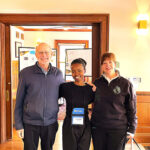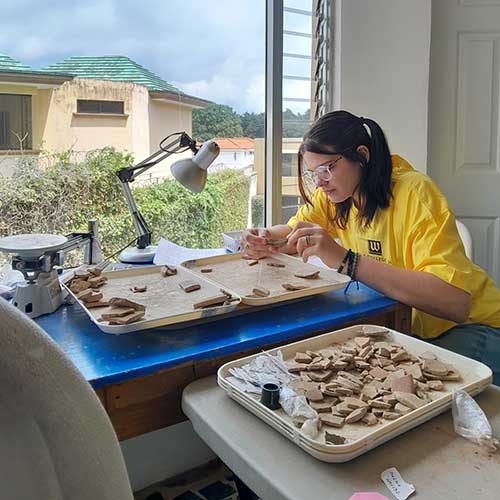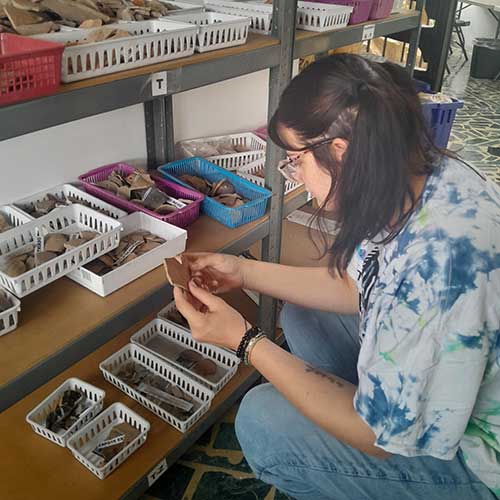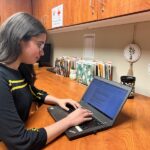
Environmental geoscience and archaeology major attains lab experience during APEX fellowship

Des Smith ’25, an environmental geoscience and archaeology major at The College of Wooster, completed an APEX fellowship with Proyecto Arqueológico Waka’ (PAW), an archaeological site located in the Laguna del Tigre National Park within the Maya Biosphere Reserve, co-directed by Olivia Navarro-Farr, associate professor of archaeology and anthropology at the College. During their fellowship, Smith worked in a lab located in San Lucas, Guatemala with artifacts discovered at the archeological site. Some of their work in the lab included analyzing, counting, weighing, and recording the contents of a group of artifacts and reconstructing vessels that were discovered at the site. Through this fellowship, Smith worked closely with a team of other students and made contributions to impactful archeological research.
“The internship helped me to both refine and broaden my idea of what archaeology is and the multi-faceted aspects of the field. It opened my eyes to more areas of study that I hadn’t considered before and encouraged me to continue to explore my field with new eyes!”
— Des Smith ’25
Q: How did you learn about the internship opportunity for your APEX Fellowship?
Smith: Olivia Navarro-Farr, professor of archaeology, sociology, and anthropology, felt as though I was a great fit for the lab, and helped me through the process of getting here. I think the group of students I worked alongside and I were all great fits, as we had a diverse set of skills, experiences, and areas of academic interest.
 Q: What interests you most about the work you did?
Q: What interests you most about the work you did?
Smith: I enjoyed reconstructing the vessels the most. It was challenging and required a lot of patience, but it was so rewarding to see the final product at the end of it. Throughout the internship, we performed various tasks, including analyzing, counting, weighing, and recording the contents of an assemblage. We also assembled vessels and created a contribution for the yearly report that is published to report on the site’s activities.
Who was your fellowship mentor and how did they help you to succeed in this position?
Smith: Hilary Edgington, visiting assistant professor of biology, was my mentor and she was so wonderful. She was understanding and compassionate about what I was experiencing and related her own personal experiences to what I was doing. She provided wonderful feedback to all my reflections and asked plenty of questions. I felt like she really cared about my experience and how my learning was occurring during my time at my internship site.
Q: What are some skills you’ve learned that you see yourself carrying forward in your career?
Smith: Teamwork is a huge skill that I’ve learned. You can’t have an ego in archaeology, and you must be willing to work with a group of people and genuinely listen and accept other opinions and ideas, even if it isn’t the solution or idea you first thought of.
Q: How has the internship helped you to see what’s next for you?
Smith: The internship helped me to both refine and broaden my idea of what archaeology is and the multi-faceted aspects of the field. It opened my eyes to more areas of study that I hadn’t considered before and encouraged me to continue to explore my field with new eyes.
Posted in Experiential Learning, Showcase Stories 2024 on August 10, 2024.
Related Posts
Related Areas of Study
Environmental Geoscience
Investigate the impact humans have on the Earth and research ways to solve pressing environmental problems.
Major MinorArchaeology
Fieldwork and research are a big part of the study of prehistoric and historical archaeology
Major Minor

